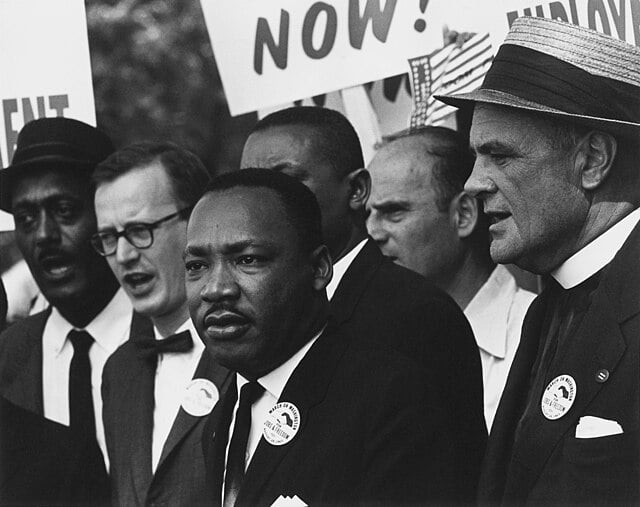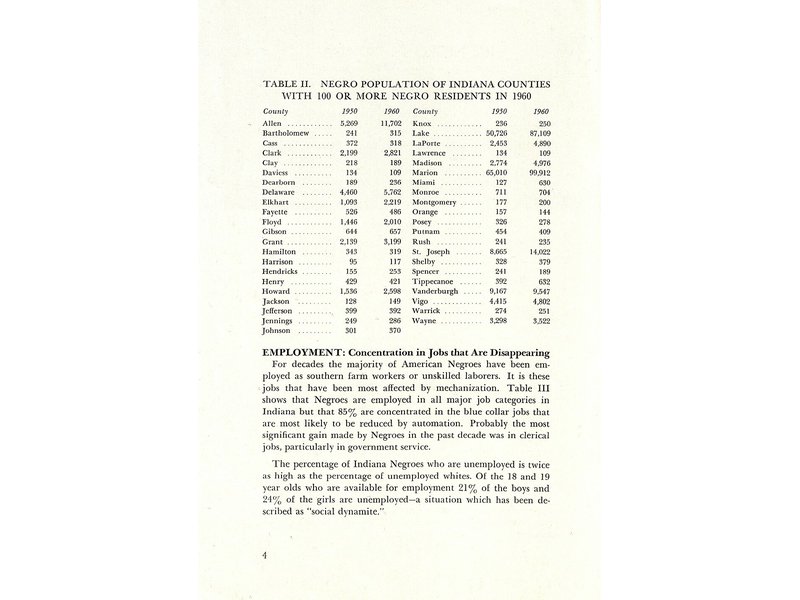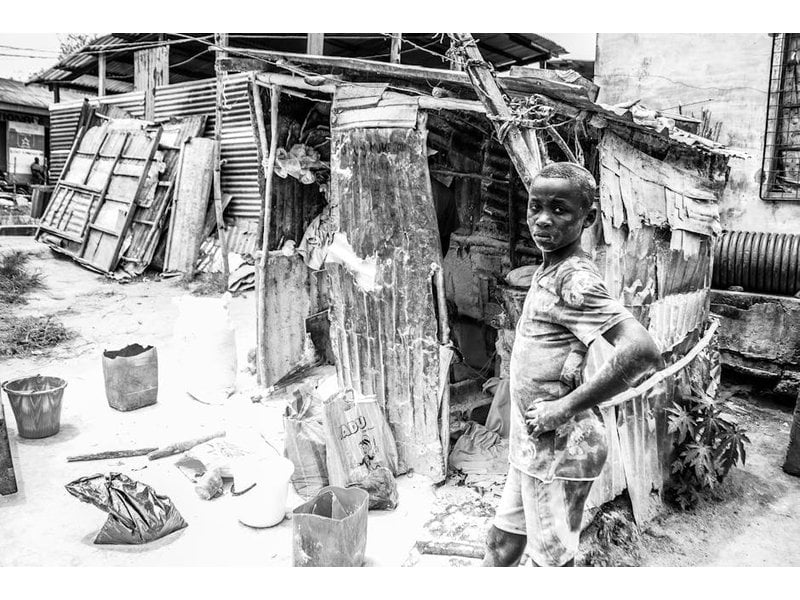001 public speeches

"Some public speeches may become significant acts of nonviolent protest. They may be spontaneous in some unexpected situation, they may be formal addresses, or they may be sermons delivered during religious services. In 1934, for example, when the Nazis were simply a minority in a coalition cabinet headed by Hitler as Chancellor, the non-Nazi ViceChancellor was Franz von Papen. In a dramatic, rather untypical act, Papen"...
Potentially awesome partners

Potentially problematic matches


High scoring campaigns using this method
Historical cases from the Nonviolent Action Database that used this method
Malians defeat dictator, gain free election (March Revolution), 1991
General Moussa Traoré obtained power in Mali in 1968 when he led a military coup d’etat that overthrew the left-leaning nationalist government that had ruled since 1960. Opposition towards Traoré grew during the 1980s, but didn’t fully emerge until t...
Colombians overthrow dictator, 1957
The strikes and demonstrations that deposed President Gustavo Rojas Pinilla of Colombia were planned somewhat day to day and began as reactionary actions in response to Rojas’s attempts to hold power indefinitely. The opposition to Rojas had a wide b...
U.S. anti-nuclear activists and community members force closure of Shoreham Nuclear Power Plant, 1976-1989
In 1965 Long Island Lighting Company (LILCO) president John J. Tuomy announced the intent to open a nuclear power plant in East Shoreham on Long Island New York at LILCO’s annual shareholders' meeting. Construction on the site commenced in 1973.\n\nI...
Chinese residents force relocation of chemical plant in Xiamen, 2007
It was announced in November 2006 that a chemical plant producing paraxylene (PX) and teraphalic acid would be built in the Haicang District 7km from Xiamen, a city of about 3.5 million residents in southeastern Fujian Province China. The two compani...
U.S. activists stop Burger King from importing rainforest beef, 1984-1987
The 1980s saw a new consciousness of environmental awareness, particularly around the Earth’s rain forests. Scientists had discovered that, aside from their enormous biodiversity, rainforests also helped to keep carbon from being released into the at...
Kazakhs stop nuclear testing (Nevada-Semipalatinsk Antinuclear Campaign), 1989-1991
Beginning on August 29, 1949, Soviet officials conducted aboveground nuclear tests at the Semipalatinsk facility in Kazakhstan. More than one million people resided in villages in the Semipalatinsk oblast. In the next oblast, Karaganda, there were tw...
Trans-national resistance forces South Africa out of the Mexico City Summer Olympics, 1968
During the 1964 Tokyo Olympics, the International Olympic Committee (IOC) banned the South African team from participating in the Olympics in order to demonstrate the unified and international disapproval of South African apartheid.\n\nIn order to pa...
Clean Air Coalition of Western New York hold Tonawanda Coke accountable for air pollution, 2005-2009
By the start of the 21st century, there were 53 active industrial plants in the area around Tonawanda, New York. Residents of the area had complained about air quality problems for decades, but regulators failed to intervene to ensure plants complied...
Kansas miners strike and women march for industrial freedom, 1921-22
In the early twentieth century, Kansas was the third largest coal producing state in the United States, with more than 8,000 unionized miners concentrated in the two southwestern counties of Crawford and Cherokee. In January 1920, the Kansas legislat...
Cree (First Nations) stop second phase of James Bay hydroelectric project, 1989-1994
In 1972, Matthew Coon Come, a young Cree student, happened upon a newspaper article that proclaimed Quebec’s ‘hydroelectric project of the century’. Looking at a map attached to the article, Matthew realized that his community’s lands in northern Que...
Low scoring campaigns using this method
Historical cases from the Nonviolent Action Database that used this method
Gazans March for the Right to Return to Their Homes, 2018-2019
From 30 March 2018 to 26 December 2019, Gazans protested at the Israeli border every Friday for the right of Palestinian refugees to return to their homes and land that they had been displaced from since 1948. This series of demonstrations is known n...
Turkmen senior citizens campaign against pension cuts, 2006
Turkmenistan is a country in Asia, located north of Iran and Afghanistan, with a population of approximately 6 million. President Saparmurat Niyazov came to power after the dissolution of the Soviet Union in 1991, and remained in power until late 200...
Paul Robeson High School Students in New York Campaign Against Closing, 2009-2011
Paul Robeson High School opened in Brooklyn, New York, 1984, as a replacement for the closed Alexander Hamilton High School. The school board’s vision for the new Robeson High School focused primarily on decreasing the dropout rate. To ensure this, t...
Montgomery, Alabama students sit-in for U.S. Civil Rights, 1960
The Montgomery, Alabama sit-ins took place during the era of Jim Crow laws in the southern United States. The first of the Supreme Court rulings against these laws – which are symbolized by the phrase “Separate but Equal” – took place in 1954, in the...
Yale University students protest sweatshop labor, 2000
On 1 March 2000, 400 Yale University students rallied to demand that their administration withdraw from the Fair Labor Association (FLA) and join the Workers Rights Consortium (WRC) instead. Both organizations focused on monitoring sweatshop labor an...
Austrian communist workers general strike for better wages, 1950
Following the conclusion of World War Two, Austria was separated from Germany and zones were created, each of which was controlled by one of the four allies (United States, United Kingdom, France, Soviet Union). Austria had a crippled economy because...
Seychellois campaign for free independent radio, 2006
The Republic of Seychelles is a small island nation in the Indian Ocean, east of Tanzania. The Seychelles People’s Progressive Front (SPPF) has held power in the Republic of Seychelles since their coup d’etat in 1977. Despite laws that nominally prov...
Hong Kong citizens demand democratic safeguards for upcoming election (Umbrella Movement), 2014
Hong Kong, a special administrative region of China, has spent the last several centuries under the control of alternating powers. In 1942, Britain began its occupation of Hong Kong, following the First Opium War and the Treaty of Nanking. Japan occu...
Iranians protest election results, 2009
Iranians turned out in large numbers to elect their President on 12 June 2009. The candidates included the incumbent and favorite of the religious authorities, Mahmoud Ahmadinejad, as well as three challengers: Mir-Hossein Mousavi, Mohsen Rezaee, and...
US Students Campaign to Stop Dow Chemical Company From Manufacturing Napalm (1967-1969)
The United States first used Napalm as an incendiary device in Japan during WWII. It melted flesh and produced horrific wounds. Napalm once again took on a functional role for the US in Vietnam, and the government requested bids from chemical manufac...


